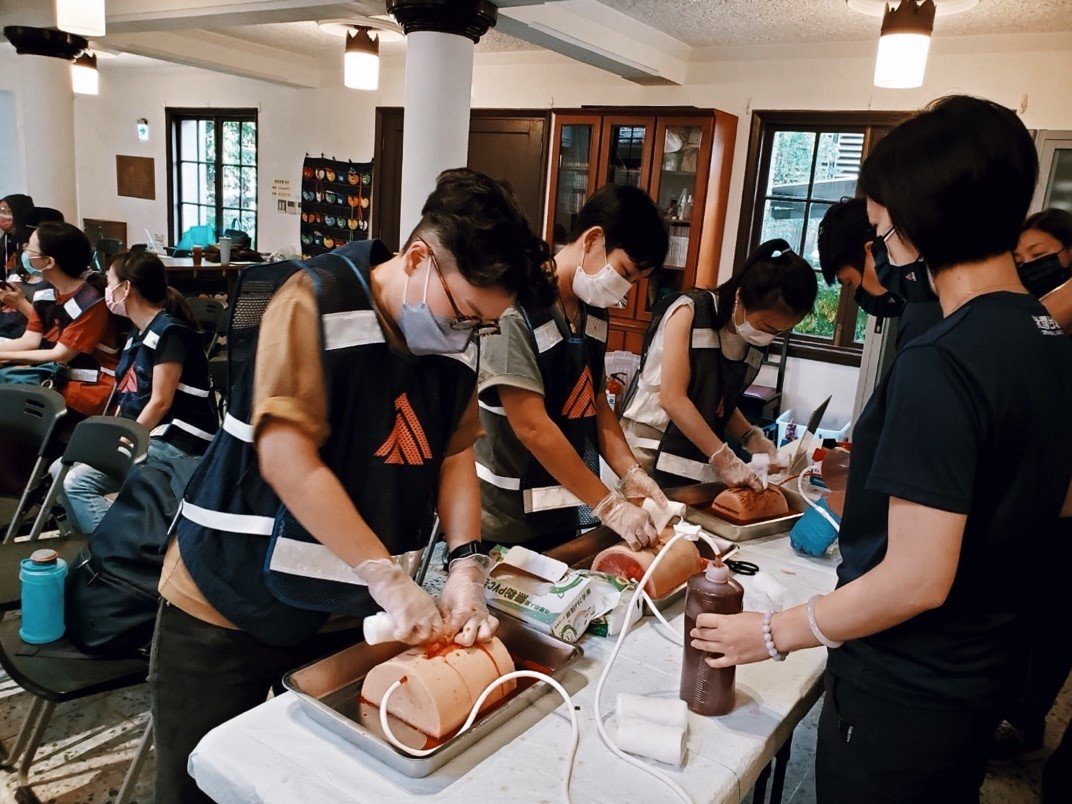"Reading Women" by Carrie Schneider
Queer Theory | Affect Theory | Critical Psychology | Asian American and Diaspora | Security | GeopoliticsWar Preparedness, (In)Security, and Civil Defense in Taiwan
Attending a civil defense workshop led by Forward Alliance. Photo by Wen Liu. 2022.
Russia’s war on Ukraine has destabilized the geopolitical consensus between global superpowers. Meanwhile, the war has also raised issues about China’s potential invasion of Taiwan. As a small country with limited international access, Taiwan cannot play in the same game as superpower nations. However, the broad-based grassroots mobilization from civil society as well as the government of Ukraine has shown that international solidarity can be deployed as a deterrence strategy. What are the ways in which Taiwanese civil society has responded to the crisis of war? How does the mobilization of civil defense change the subjectivity around war preparedness among Taiwanese?
Reference work: 1) The Mundane Politics of War in Taiwan: Psychological Preparedness, Civil Defense, and Permanent War. 2) 民防作為一場公民運動:將「心防」視為備戰關鍵; 3) From Taiwan to Ukraine: Geopolitical Realignment and Anti-colonial solidarity in a time of war. Spectre Journal.
Sunflower Movement Protest in NYC, 2014. Photo by Enbion Aan 2014.
Protests, (Non)-Sovereignty, and Decolonization
The 2014 Sunflower Movement in Taiwan and the 2019 Anti-Extradition Bill Amendments Law (anti-ELAB) protests in Hong Kong have instigated a wide range of political participation and broader social debates on issues of imperialism, nationalism, ethnic identity, and decoloniality. Situated in between multiple forms of empires, how do Taiwanese people and Hongkongers find our way toward a left-leaning and anti-colonial vision of self-determination against the hegemonic paradigm of the “New Cold War”? How do we build alliances with activists beyond ethnic, sexual, and national boundaries?
Reference work: 1)From Independence to Interdependence: Taiwan Independence as Critique, Strategy, and Method toward Decoloniality. American Quarterly; 2) Reorienting Hong Kong’s Resistance: Leftism, Decoloniality, and Internationalism. Palgrave MacMillian.
#Asians4BlackLives in NYC.
Asian American Racial Politics, Black Lives Matter, and “Stop Asian Hate”
Drawing from ethnographic fieldwork in the Black Lives Matter movements based in New York City, this article focuses on the split within Asian American body politics between those for and against the centering of Black lives. Whereas an Asian American body politic risks being co-opted as a form of anti-Black white assimilation, the author also highlights the resistance of Asians for Black Lives activists and their attempt to recuperate Asian American identity for cross-racial solidarity.
Reference work: 1) Complicity and resistance: Asian American body politics in black lives matter. Journal of Asian American Studies; 2) Against the Politics of Injury: On the Dangers of Asian American Liberal Antiracism. position politics.
"neuron fractal 1" by amattox mattox is licensed under CC BY-NC 2.0
Affect Theory and Queer Subjectivity
The affective turn that has emerged in academia problematizes the previous dichotomous conceptualization of essentialism and social constructionism. It also points toward a new direction for the study of human—and beyond human— experience. Situating queer subjectivity and politics in this paradigm shift, I engage with shame as a critical concept distinct from the sexual minority framework dominating North American LGBTQ psychology to disentangle questions of identity, agency, social movements, and the body.
Reference work: 1) Feeling down, backward, and machinic: queer theory and the affective turn. In Special Issue: Mapping Affect Studies; 2) Restarting from shameful places: Toward a queer psychology of affect. Subjectivity.




